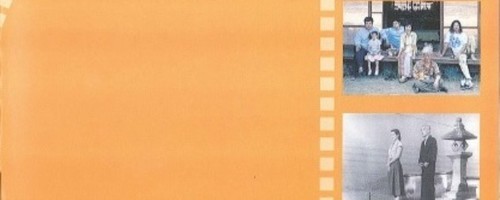Bokunchi – My House
ぼくんち
2002 / 115min / Color
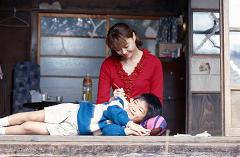
STAFF:
Director : SAKAMOTO Junji
Producers : TSUKADA Yuki
SENO Keita
Screenplay : UNO Isamu
Original Story : SAIBARA Rieko
CAST:
Kanoko : MIZUKI Arisa
Itta : YAMOTO Yuma
Nita : TANAKA Yuki
Kyoko : OHTORI Ran
SYNOPSIS:
Kyoko, mother of Itta and Nita, comes back home to Suihei Island after a long absence. This time she’s there to introduce the two young boys to their big sister, Kanoko. All three were born of different fathers and this is the beginning of their new life together. The poverty of Suihei Island is coloured with various unique residents such as Kohei, a punk who’s gentle to women and children, and Tetsu-ji, an iron scrap scavenger. One day, the three siblings are evicted because of the unexpected sale of the deed to their house, and end up living in an apartment. In order to support them, Kanoko starts working at a filthy brothel which the older of the two brothers, Itta, can’t bear. Wanting to be independent, Itta leaves the island. Kanoko forgives errant mother Kyoko, who caused all this trouble, and also admits Nita is actually her own son and decides to send him to a main land for better living.
NOTES:
Directed by Sakamoto Junji, whose name is highly acclaimed in the international film festival circuit. The film is based on the Saibara Rieko’s best-selling comic series, which received the Bungei-Shunju Comic Award.
Chibimaruko Chan
ちびまる子ちゃん 大野君と杉山君
1999 / 94min / Color
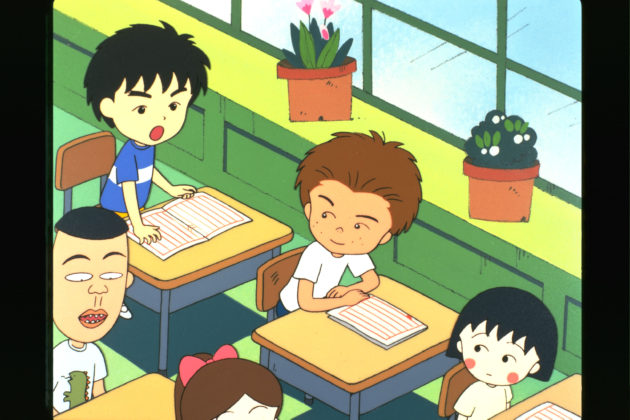
STAFF:
Director : SHIBAYAMA Tsutomu
Executive Producer : MOTOHASHI Koichi
Producer : SATO Shoji
Based on the comic by : SAKURA Momoko
Screenplay : SAKURA Momoko
Director of Animation : YAMADA Michishiro
NAKAJIMA Junzo
Cinematography : MORITA Toshiaki
CAST:
Chibimaruko : TARAKO
Ohno : YAMAGUCHI Kappei
Sugiyama : MIZUHARA Rin
Maruko’s father : YARA Yusaku
Maruko’s mother : SUZUKI Mie
SYNOPSIS:
As the second term commences, Maruko and her classmates return to their small groups. Maruko’s group includes two naughty boys and Maruko is forced to be one of their subordinates. She seems to face a lot of pressure at school. As the school’s athletic meet approaches, all the classmates are busy exercising. Maruko is no exception, although her laziness means that she is late sometimes. Maruko realizes that the two boys rival each other in everything they do, and that their friendship is deep and strong.
NOTES:
The story is based on the comic by SAKURA Momoko. “Chibimaruko-chan” has been broadcasted on TV for more than 15 years.
Ping Pong Bath Station
卓球温泉
1998 / 110min / Color

STAFF:
Written and Directed by : YAMAKAWA Gen
Chief Executive Producer : TOKUMA Yasuyoshi
Executive Producers : KATO Hiroyuki
URUSHIDO Seiji
OHNO Shigeru
IGARASHI Kazuhiro
Chief Producer : IKEDA Tetsuya
Producers : MASUI Shoji
ARISHIGE Yoichi
CAST:
Sonoko : MATSUZAKA Keiko
Kanae : MAKISE Riho
Tetsuro : KANIE Keizo
SYNOPSIS:
Sonoko Fujiki, an ordinary 42- year-old housewife, lives in a multi-story condominium in Tokyo. Her daily routine consists of cooking, washing, cleaning — nothing more, nothing less. Although she seems to have a happy family life on the surface, her husband Tetsuro is a workaholic, who goes to the office even on holidays. Her son Atsushi, a high school student, doesn’t stay at home much. It could been said that the Fujiki family has a house but not a home. Sonoko, devoted to serving her family by performing an endless routine of household chores, often feels empty and depressed.
One day, Sonoko calls a radio DJ, Kanae for advice. While on the air, she asks her, ”Why can’t I be the wife or woman I used to be now that I’m a mother?” Kanae hears the pain in Sonoko’s voice and irresponsibly suggests that she run away from home. The next morning, her husband and her son are shocked to see on the family message board “I am leaving home. Sorry, Sonoko.”
When Sonoko arrives at an inn at Ryugu hot spring, she remembers she stayed there twenty years ago with Tetsuro after they got married. She feels relaxed in the hot spring, but also still worries about what to do next.
In the morning, she rises at her as usual carly hour, but finds herself restless. Needing something to do to get rid of her energy, she starts cleaning the deserted inn and finds table-tennis equipment in the playroom.
The Taste of Tea
茶の味
2003 / 143min / Color
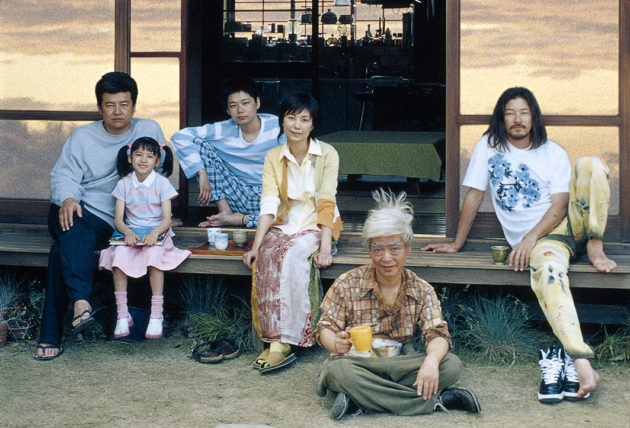
STAFF:
Director : ISHII Katsuhito
Screenplay : ISHII Katsuhito
Executive Producer : IIIZUMI Hiroyuki
Animation Director : KOIKE Ken
Cinematography : MATSUSHIMA Kosuke
CAST:
HARUNO Sachiko : BANNO Maya
HARUNO Hajime : SATO Takahiro
HARUNO Ayano : ASANO Tadanobu
HARUNO Yoshiko : TEZUKA Satomi
HARUNO Nobuo : MIURA Tomokazu
TODOROKI Akira : GASYUIN Tatsuya
SYNOPSIS:
Meet the Harunos, a rather unconventional, but happy and loving family nonetheless. They live in a small town in the mountains just out of Tokyo where life is good and quiet – but that doesn’t mean they don’t have their own little problems.
As 8-year-old Sachiko tries to get rid of a giant version of herself who seems to pop up everywhere, her older brother Hajime, privately wrestles with his love-struck heart. Meanwhile, their mother Yoshiko is working hard, coming out of retirement as an animator, as her husband and professional hypnotist Nobuo watches on with slight apprehension. Yoshiko’s brother, Ayano is just visiting his hometown and staying with the family, but also has ashidden agenda; he needs to come to terms with a romance that ended years ago. Even Nobuo’s brother and successful manga artist Todoroki has his problems. It’s his birthday soon and he wants to give himself something special. And lastly there’s Grandpa, the most bizarre and perhaps the most perceptive of all, who continues to search for a better way to live to the full.
NOTES:
The film was screened at Cannes Film Festival 2004.
Tokyo Story
東京物語
1953 / 135 min / Black & White
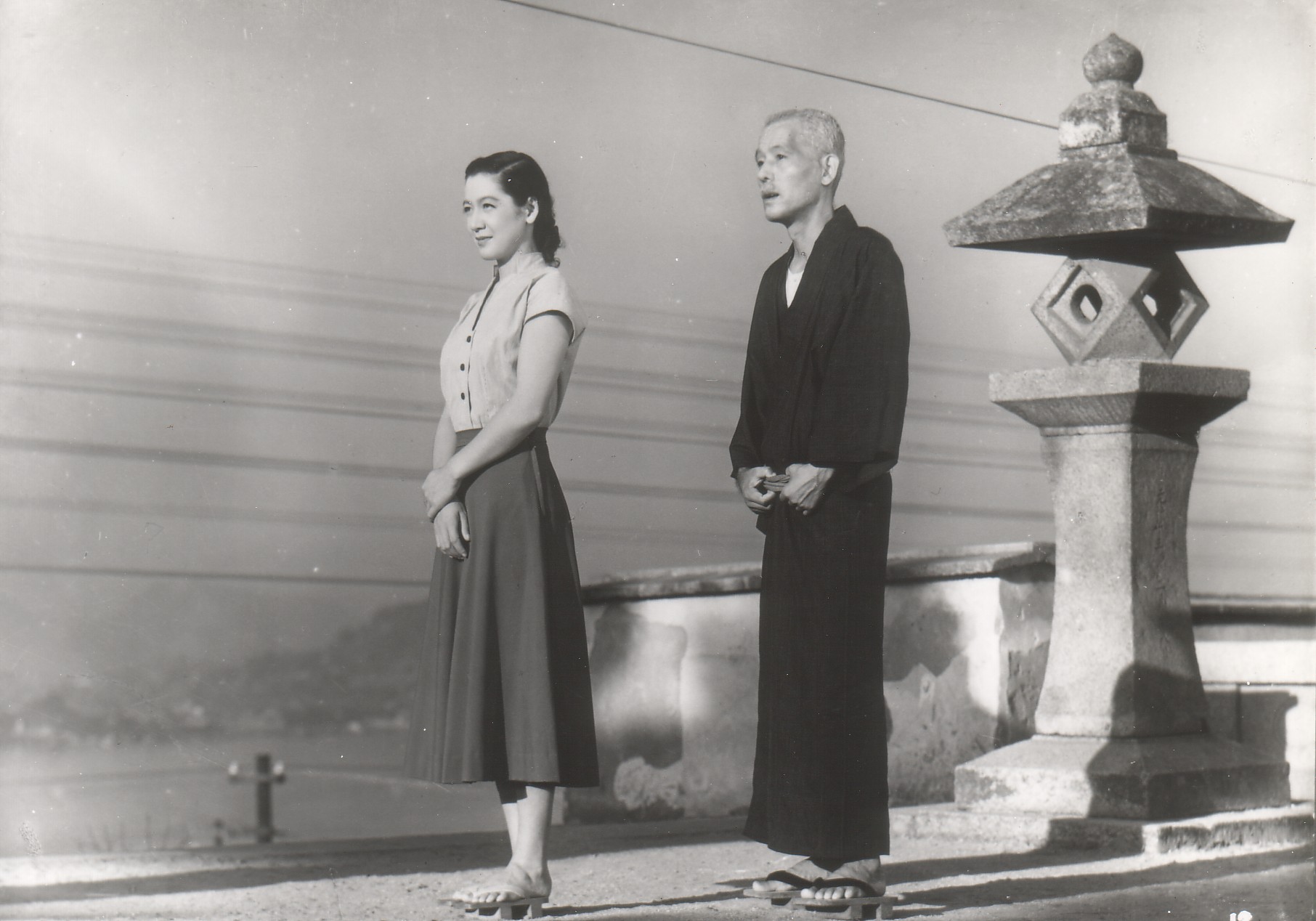
STAFF:
Director : OZU Yasujiro
Screenplay : NODA Kogo
OZU Yasujiro
Cinematography : ATSUDA Yuharu
Art Director : HAMADA Tatsuo
Music : SAITO Takanobu
Producer : YAMAMOTO Takeshi
CAST:
Hirayama Shukichi : RYU Chishu
Tomi (his wife) : HIGASHIYAMA Chieko
Noriko (wife of Shukichi’s second son) : HARA Setsuko
Kaneko Shige (Shukichi’s first daughter) : SUGIMURA Haruko
Hirayama Koichi (Shukichi’s first son) : YAMAMURA So
SYNOPSIS:
HIRAYAMA SHUKICHI and TOMI, elderly man and wife, come to Tokyo from Onomichi after an interval of 20 years and stay with the family of their oldest son KOICHI who has a small clinic in the suberbs of Tokyo. KOICHI is unable to afford timewise and financially to give his parents enough care and attention. Feeling unwanted, they move to their oldest daughter SHIGE’s place. As she runs a beauty shop, she is always hustling and bustling. She bluntly shows her annoyance to them and talks them into going to Atami, a hot spring town. Disturbed by noise at an inn, however, they only stay one night at Atami and comes back to Tokyo. Upon returning, SHUKICHI visits his old friend NUMATA and complains about the coldness of his children. TOMI goes to see NORIKO, the widow of her deceased younger son, at her apartment. She is very happy to receive a warm welcome from NORIKO who is not related by blood.
NOTES:
In 1957, the film was raved when it was shown at the National Film Theatre in London on the occasion of “Japan Cinema Week” and won the Sutherland Award given to the best film shown at the theatre in that year, which marked the outset of OZU boom.
Village of Dreams
絵の中のぼくの村
1996 / 112min / Color
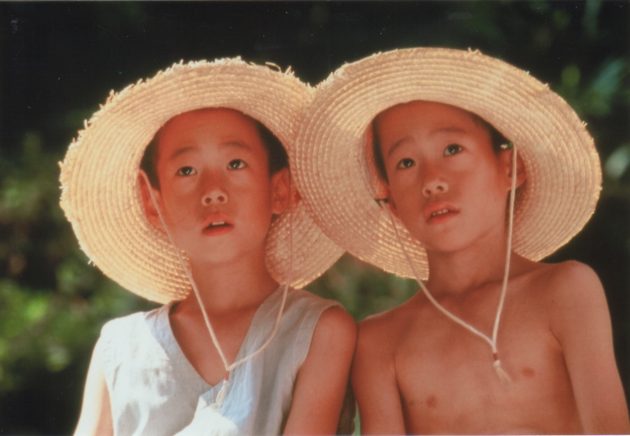
STAFF:
Director : HIGASHI Yoichi
Screenplay : HIGASHI Yoichi
NAKAJIMA Takehiro
Based on an essay by : TASHIMA Seizo
Cinematography : SHIMIZU Yoshio
Producers : FUJISAWA Katsunori
HAGIWARA Yoshihiro
CAST:
Seizo : MATSUYAMA Keigo
Yukihiko : MATSUYAMA Shogo
Mizue : HARADA Mieko
Kenzo : NAGATSUKA Kyozo
Jinma : KOMATSU Hosei
SYNOPSIS:
Identical twin brothers Yukihiko and Seizo Tashima are award-winning painters and book illustrators. The brothers were born and raised in a tiny village in Kochi district — an idyllic rural setting which has influenced their very different artistic styles. One lazy summer day, Seizo visits his brother’s studio; the two artists are to work together on a new book based on their shared childhood.
Their drawings sweep us back to 1948, to a rustic hamlet in the countryside of Kochi. The twin brothers are attending the third grade of the village school where they are infamous as troublemakers. Their youthful exuberance occasionally leads them to destroy things — at one point they tear the leaves off a neighbor’s potato plants. Following such pranks their mother, a teacher, must make the rounds through the village apologizing for her boys’ behavior. In spite of their closeness, or perhaps because of it, the twins occasionally have sudden fierce arguments. They are unshakably agreed, however, about one thing: they both have encountered strange supernatural appearances. For instance, there are three eerie old women who protect them and who seemed to come from another world…
The seasons pass without any great changes to the usually quiet and ordered village life. It is only when the twins go too far with one of their thoughtless pranks and deeply hurt friends poorer than themselves that they began to create worlds of their own.
NOTES:
This film “Village of Dreams” won the Silver Bear at the Berlin Film Festival in 1996.


